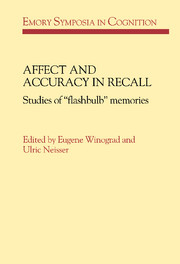Book contents
- Frontmatter
- Contents
- Preface
- List of contributors
- 1 Introduction
- Part I Empirical studies
- Part II Developmental studies
- 5 Developmental issues in flashbulb memory research: Children recall the Challenger event
- 6 Preschool children's memories of personal circumstances: The fire alarm study
- Part III Emotion and memory
- Part IV Theoretical issues
- Author index
- Subject index
6 - Preschool children's memories of personal circumstances: The fire alarm study
Published online by Cambridge University Press: 22 March 2010
- Frontmatter
- Contents
- Preface
- List of contributors
- 1 Introduction
- Part I Empirical studies
- Part II Developmental studies
- 5 Developmental issues in flashbulb memory research: Children recall the Challenger event
- 6 Preschool children's memories of personal circumstances: The fire alarm study
- Part III Emotion and memory
- Part IV Theoretical issues
- Author index
- Subject index
Summary
Several years ago, the teacher of a preschool class in the Boston area held a morning meeting to announce a sad occurrence: The mother of one of the children had died following a long illness. As the teacher began to talk, several children anticipated the topic: “K's mom died”; “I know, K's momdied.” Some children also spontaneously described their own personal circumstances when they originally heard the news: “My mom told me at the hospital”; “My mom told me at breakfast”; “My mom was making orange juice”; “My mom and dad told me”; “My mom said, ‘You won't be able to realize this.’” The teacher explained that K was fine, that K's mother had been sick for a long time, that the event was very unusual, and that it made people feel very sad. The discussion then turned to the general topic of death and the children's fears and misconceptions.
Preschool personnel observed and recorded the emotionally charged discussion, but had they not been aware of the author's interest in memories of personal circumstances, they might well have overlooked the children's comments about how they had “heard the news.” The target event itself – the death of a parent of a young classmate – was terrifying, and needed to be presented and discussed in a supportive context. On the other hand, the children's memories of their own circumstances upon hearing the news evoke the same sense of “mystery” first identified by Brown and Kulik (1977) with respect to adults' “flashbulb” memories of public tragedies.
- Type
- Chapter
- Information
- Affect and Accuracy in RecallStudies of 'Flashbulb' Memories, pp. 121 - 138Publisher: Cambridge University PressPrint publication year: 1992
- 16
- Cited by



